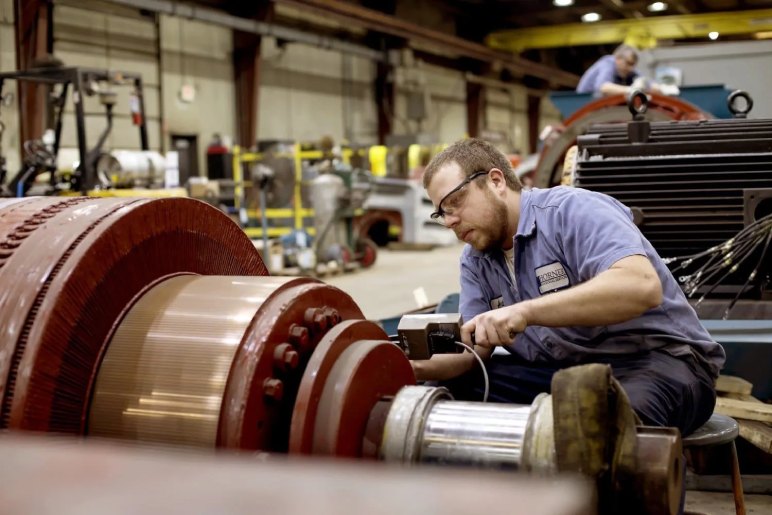Capital goods, the unsung heroes of economic machinery, lie at the heart of every industry. From the towering wind turbines spinning in the distance to the intricacies of a computer chip, these durable goods serve as the backbone of production, powering progress and prosperity. But beyond the tangible products, lies a thriving human element – the jobs in capital goods.
So, how many opportunities does this vast and diverse industry hold for job seekers? The answer, like the industry itself, is multifaceted.
Quantifying The Engine: Estimates And Variations

Pinpointing the exact number of jobs in capital goods can be a tricky endeavor. Its sheer breadth, encompassing numerous sub-sectors like machinery manufacturing, construction equipment, and aerospace, defies a singular definition. Nevertheless, estimates paint a promising picture. Studies suggest the industry currently employs between 970,000 and 1.3 million individuals in the United States alone. That’s a significant number, offering a wide spectrum of careers for passionate individuals seeking to build the tools that build the world.
But this figure is just the tip of the iceberg. The Bureau of Labor Statistics (BLS) categorizes many capital goods occupations under broader classifications like “machinery manufacturing” or “wholesale trade.” When examining these broader categories, the job landscape expands dramatically. As of May 2020, the BLS reported approximately 1.1 million jobs just in the machinery manufacturing sector, a key cog in the capital goods machine.
However, it’s crucial to remember that these numbers are dynamic. Economic cycles, technological advancements, and global trends all play a part in shaping the landscape. While some sub-sectors might experience temporary dips, others could witness explosive growth. For example, the burgeoning renewable energy sector presents exciting opportunities for workers across the capital goods spectrum, from engineers designing innovative wind turbines to technicians servicing solar panels.
A Symphony Of Roles: The Diverse Composition Of Capital Goods Jobs

The beauty of the capital goods industry lies in its diversity. It’s not a monoculture of identical jobs; it’s a vibrant ecosystem where expertise from myriad fields converges to create tangible outputs. From the skilled hands of machinists wielding torches to the sharp minds of engineers conceptualizing complex systems, each role contributes to the symphony of production.
This diversity translates into a plethora of career paths for individuals with varying skillsets and educational backgrounds. Here’s a glimpse into some of the key roles driving the industry:
- Production and manufacturing: This group encompasses a wide range of professionals. From skilled welders and operators to quality control inspectors and production supervisors. Their dedication to precision and efficiency ensures the smooth flow of goods from concept to completion.
- Engineering and design: From conceptualizing futuristic aircraft to optimizing industrial robots, engineers are the architects of innovation in capital goods. Their technical prowess and creative minds push the boundaries of what’s possible, shaping the tools of tomorrow.
- Sales and marketing: Capital goods are complex beasts, and effectively communicating their value requires expertise. Sales and marketing professionals play a crucial role in connecting manufacturers with the right customers, navigating complex technical details, and ensuring mutually beneficial partnerships.
- Information technology (IT) and data analytics: As technology permeates every aspect of the industry. The role of IT and data professionals becomes increasingly vital. From integrating automation systems to analyzing production data for optimized outcomes. Their skills ensure the smooth operation of the digital backbone.
- Research and development (R&D): Innovation is the lifeblood of capital goods. R&D personnel push the frontiers of science and technology, constantly seeking new materials, processes, and designs to improve efficiency and performance.
This is just a snapshot of the diverse careers available in capital goods. From project managers and supply chain specialists to maintenance technicians and environmental engineers. The industry offers a plethora of opportunities for individuals looking to leverage their talents and contribute to something tangible.
The Future Of Work: Capital Goods In A Changing Landscape

The world of work is in flux, and capital goods are no exception. Automation, artificial intelligence (AI), and the rise of the gig economy are redefining how we work and what skills are required. While some jobs might be displaced by technology, others will evolve and new roles will emerge, demanding new skillsets and a focus on lifelong learning.
For individuals entering the capital goods workforce, adaptability and a willingness to embrace change will be key. Upskilling and reskilling through training programs and certifications will become increasingly important. The ability to work with automation, analyze data, and collaborate effectively will be highly sought after.
However, despite the changing landscape, one thing remains constant: the demand for skilled and passionate individuals who can turn ideas into reality. The capital goods industry, with its focus on tangible outputs and constant innovation, will continue to offer a multitude of rewarding opportunities for those who are eager to build the future, one gear, one circuit board, at a time.
In conclusion
The capital goods industry presents a vibrant and diverse job landscape brimming with opportunities for individuals seeking to build the tools that build the world. Although pinpointing a precise number of available jobs is challenging, estimates suggest millions of roles exist across numerous sub-sectors, from machinery manufacturing to aerospace.
While the future of work in capital goods will undoubtedly be shaped by automation and technological advancements, the demand for skilled and passionate individuals remains constant. Adaptability, a willingness to embrace change, and continuous learning will be key for future workers to thrive. The ability to work with emerging technologies, analyze data, and collaborate effectively will be highly sought after.
Ultimately, the capital goods industry is not just about machines and tools; it’s about human ingenuity, innovation, and progress. For those who envision themselves as builders, problem solvers, and contributors to a world powered by advanced technology. The doors of opportunity in capital goods stand wide open. So, step into this engine of opportunity.
Read Also:
- Is Technology A Good Career Path?
- Is Major Banks A Good Career Path?
- Is Miscellaneous A Good Career Path?
- How Many Jobs Are Available In Major Chemicals?

